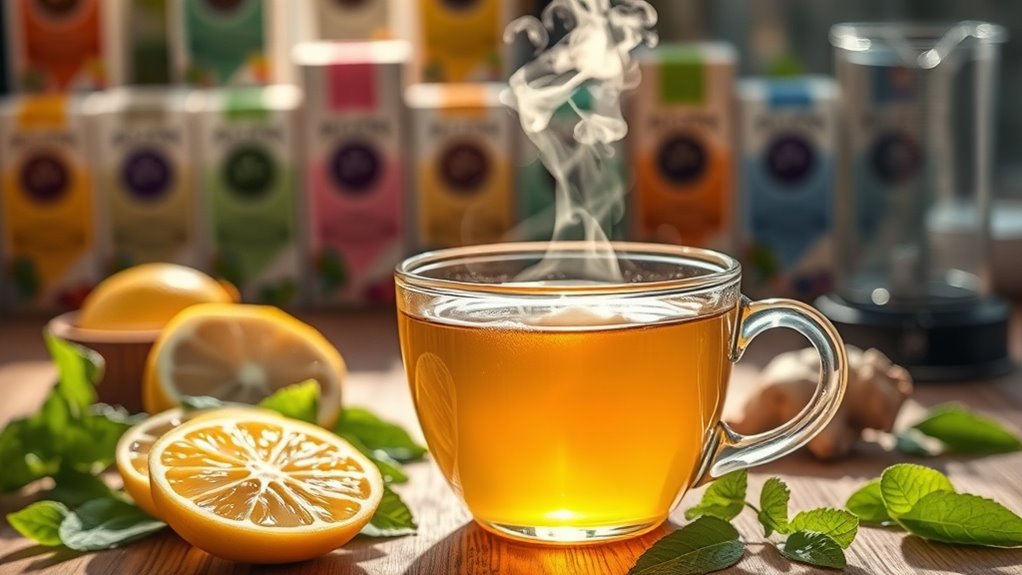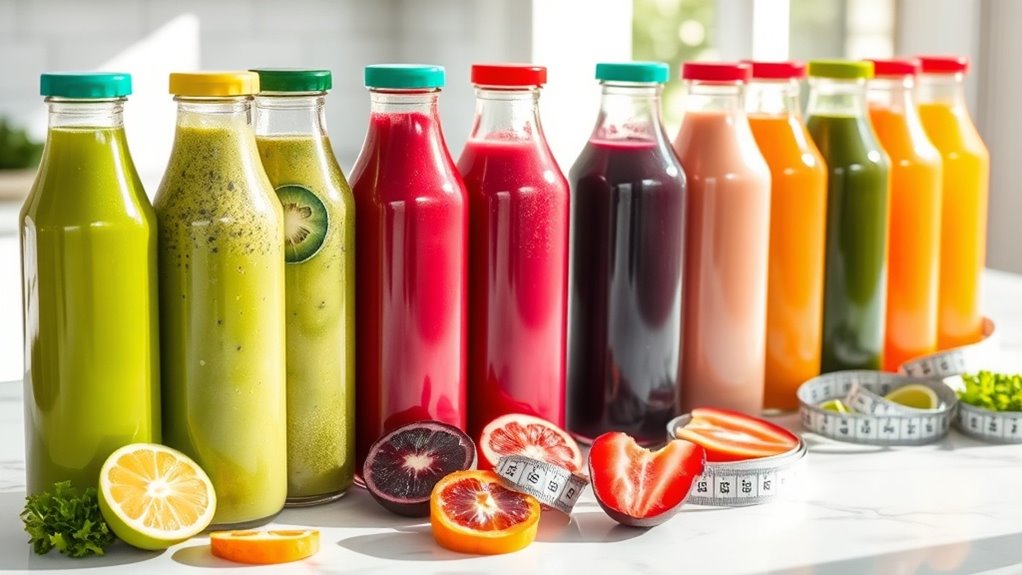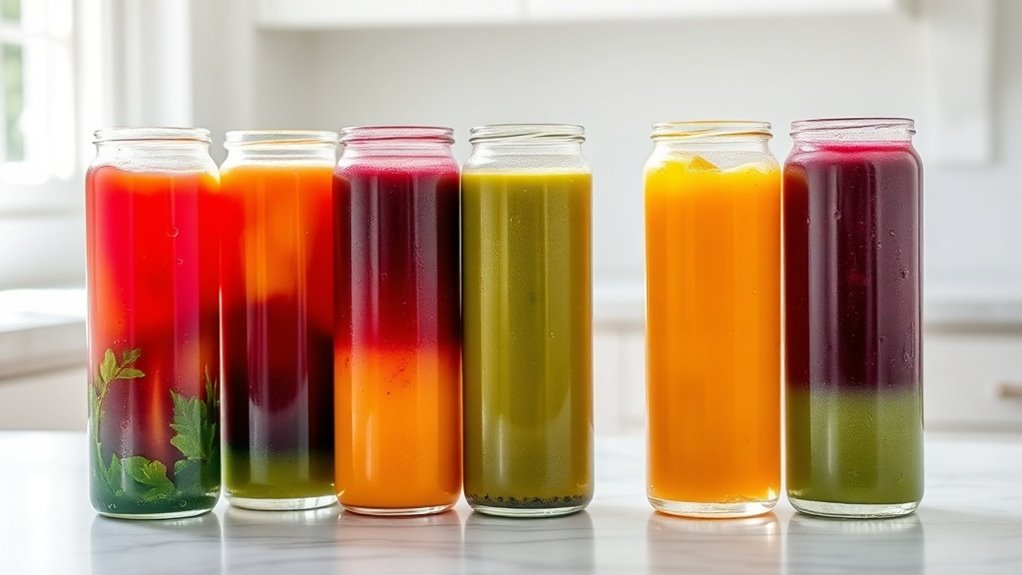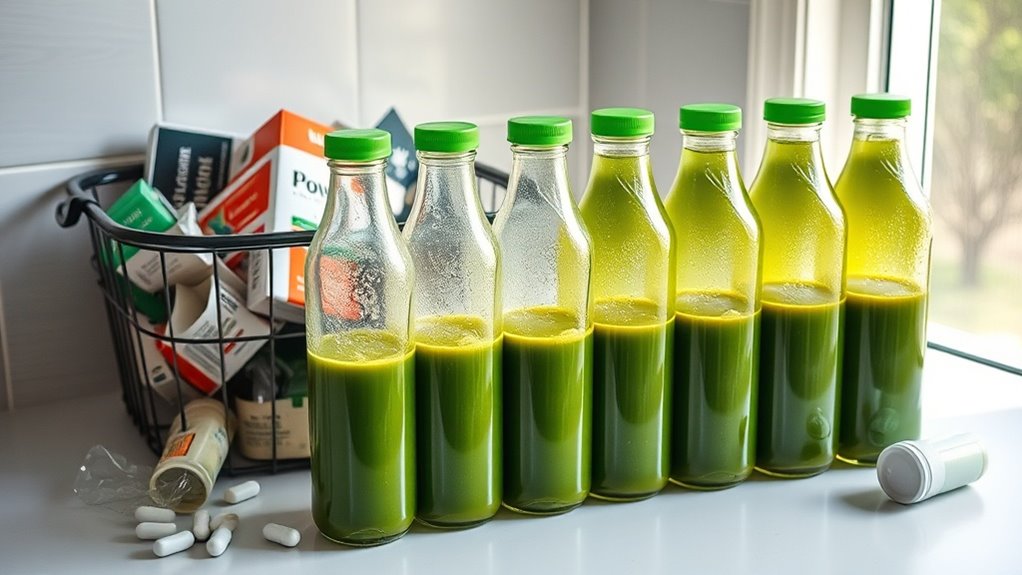Are Detox Teas Just Expensive Hype.
Understanding Detox Teas: What Are They?
What exactly are detox teas, and why have they gained such popularity? Essentially, detox teas are herbal blends marketed to cleanse the body and promote weight loss.
However, the detox teas truth reveals that scientific evidence supporting these claims is limited. Many users experience temporary results, while the long-term effectiveness and health implications remain uncertain. You should approach detox teas with caution and skepticism.
The Science Behind Detoxification
While many people associate detoxification with dramatic cleanses and rapid weight loss, the scientific foundation of detoxification processes in the body is far more complex and nuanced.
Your liver, kidneys, and other organs continuously filter toxins and metabolic waste, maintaining homeostasis.
Research indicates that supporting these organs through a balanced diet and hydration is more effective than relying solely on detox teas. Proper hydration plays a crucial role in supporting metabolism and enhancing the efficiency of your body’s detoxification processes.
Common Ingredients in Detox Teas
In detox teas, you’ll find a mix of herbal ingredients, such as dandelion and milk thistle, known for their traditional uses in promoting liver function.
Many manufacturers also add common additives like natural flavors and sweeteners to enhance taste, but these can vary widely.
Understanding the distinctions between these teas and traditional remedies can help you make informed choices about their effectiveness in detoxification.
Herbal Ingredients Overview
Detox teas often feature a variety of herbal ingredients that claim to promote cleansing and overall wellness.
Some common herbs include:
- Dandelion root: Believed to support liver function.
- Milk thistle: Known for its potential liver-protective properties.
- Ginger: Often used for its digestive benefits.
- Peppermint: May aid in digestion and reduce bloating.
These ingredients typically aim to enhance bodily detoxification processes.
Common Additives Explained
What ingredients often find their way into detox teas? Some common additives include green tea for antioxidants, peppermint for digestion, and ginger for anti-inflammatory properties. Additionally, senna is often included for its laxative effects, though its safety can be contentious. Understanding these ingredients can help you evaluate the efficacy and safety of detox teas while making informed choices about their consumption.
Teas vs. Traditional Remedies
While various detox teas boast unique benefits, traditional remedies often share many of the same ingredients, leading to a blurred line between these two approaches.
Common elements include:
- Green tea: Known for its antioxidants.
- Ginger: Often used to soothe digestion.
- Dandelion root: Traditionally used for liver health.
- Peppermint: Popular for its soothing effects.
Both methods aim to promote wellness through similar components.
Potential Benefits of Detox Teas
Among the myriad of wellness trends, detox teas claim several potential benefits that pique the interest of health enthusiasts.
These brews may aid digestion, boost metabolism, and promote hydration. Ingredients like green tea and herbal extracts often contain antioxidants, which can contribute to overall well-being.
Additionally, some users report improved energy levels and enhanced skin clarity, making detox teas an intriguing option for many.
Risks and Side Effects of Detox Teas
When considering detox teas, it’s crucial to be aware of potential risks and side effects.
Many of these teas contain laxative ingredients that can lead to dehydration and could result in nutritional deficiencies if consumed excessively.
Understanding these concerns can help you make informed decisions about using detox teas in your wellness routine.
Laxative Ingredients Concerns
Detox teas often contain laxative ingredients that can pose significant health risks.
When using these products, you should be aware of potential side effects, including:
- Cramping and abdominal pain
- Imbalance in electrolytes
- Dependency on laxatives for bowel movement
- Disruption of gut microbiome
Understanding these concerns is crucial for making informed choices about detox teas and their long-term effects on your health.
Dehydration Risks
While some people turn to detox teas for quick weight loss or cleansing, they often overlook the significant risk of dehydration. Excessive consumption can lead to electrolyte imbalances and fatigue. Understanding these risks can guide you in making informed choices.
| Dehydration Effects | Symptoms |
|---|---|
| Mild Dehydration | Thirst, dry mouth |
| Moderate Dehydration | Dizziness, fatigue |
| Severe Dehydration | Confusion, rapid heart rate |
Nutritional Deficiencies Potential
Excessive reliance on detox teas can lead to more than just dehydration; it may also result in nutritional deficiencies.
Regularly consuming these teas might deprive you of essential nutrients, which can include:
- Vitamins A and C
- Minerals like magnesium and potassium
- Protein intake
- Fiber
Inadequate nutrition can impact your overall health, so consider the balance of your diet when using detox teas.
Alternatives to Detox Teas for Cleansing
Are you searching for effective ways to cleanse your body without relying on detox teas? Consider these alternatives: a balanced diet rich in whole foods, regular hydration, and physical activity. Each option promotes natural detoxification. Here’s a quick comparison of these methods:
| Method | Benefits | Evidence |
|---|---|---|
| Whole Foods | Nutrient-rich, boosts metabolism | Supported by studies |
| Hydration | Flushes toxins, supports organs | Science-backed |
| Exercise | Enhances circulation, detoxifies | Proven effectiveness |
Additionally, maintaining consistent hydration throughout the day can significantly aid in proper hydration for optimal body functions.





